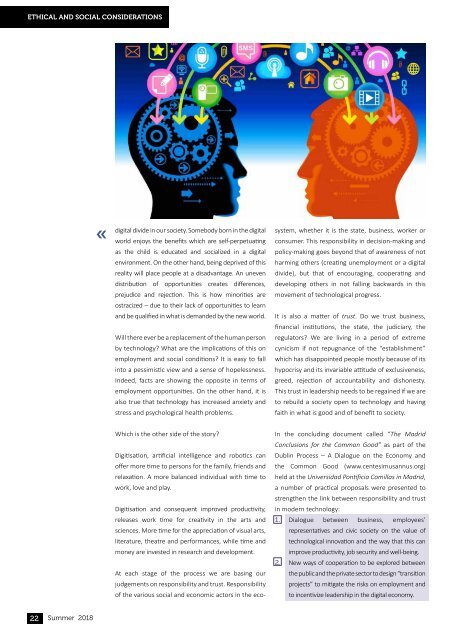ACCOUNTANT_SUMMER18_AMENDED_PG12
Create successful ePaper yourself
Turn your PDF publications into a flip-book with our unique Google optimized e-Paper software.
ETHICAL AND SOCIAL CONSIDERATIONS<br />
digital divide in our society. Somebody born in the digital<br />
world enjoys the benefits which are self-perpetuating<br />
as the child is educated and socialized in a digital<br />
environment. On the other hand, being deprived of this<br />
reality will place people at a disadvantage. An uneven<br />
distribution of opportunities creates differences,<br />
prejudice and rejection. This is how minorities are<br />
ostracized – due to their lack of opportunities to learn<br />
and be qualified in what is demanded by the new world.<br />
Will there ever be a replacement of the human person<br />
by technology? What are the implications of this on<br />
employment and social conditions? It is easy to fall<br />
into a pessimistic view and a sense of hopelessness.<br />
Indeed, facts are showing the opposite in terms of<br />
employment opportunities. On the other hand, it is<br />
also true that technology has increased anxiety and<br />
stress and psychological health problems.<br />
Which is the other side of the story?<br />
Digitisation, artificial intelligence and robotics can<br />
offer more time to persons for the family, friends and<br />
relaxation. A more balanced individual with time to<br />
work, love and play.<br />
Digitisation and consequent improved productivity,<br />
releases work time for creativity in the arts and<br />
sciences. More time for the appreciation of visual arts,<br />
literature, theatre and performances, while time and<br />
money are invested in research and development.<br />
At each stage of the process we are basing our<br />
judgements on responsibility and trust. Responsibility<br />
of the various social and economic actors in the ecosystem,<br />
whether it is the state, business, worker or<br />
consumer. This responsibility in decision-making and<br />
policy-making goes beyond that of awareness of not<br />
harming others (creating unemployment or a digital<br />
divide), but that of encouraging, cooperating and<br />
developing others in not falling backwards in this<br />
movement of technological progress.<br />
It is also a matter of trust. Do we trust business,<br />
financial institutions, the state, the judiciary, the<br />
regulators? We are living in a period of extreme<br />
cynicism if not repugnance of the “establishment”<br />
which has disappointed people mostly because of its<br />
hypocrisy and its invariable attitude of exclusiveness,<br />
greed, rejection of accountability and dishonesty.<br />
This trust in leadership needs to be regained if we are<br />
to rebuild a society open to technology and having<br />
faith in what is good and of benefit to society.<br />
In the concluding document called “The Madrid<br />
Conclusions for the Common Good” as part of the<br />
Dublin Process – A Dialogue on the Economy and<br />
the Common Good (www.centesimusannus.org)<br />
held at the Universidad Pontificia Comillas in Madrid,<br />
a number of practical proposals were presented to<br />
strengthen the link between responsibility and trust<br />
in modern technology:<br />
1. Dialogue between business, employees’<br />
representatives and civic society on the value of<br />
technological innovation and the way that this can<br />
improve productivity, job security and well-being.<br />
2. New ways of cooperation to be explored between<br />
the public and the private sector to design “transition<br />
projects” to mitigate the risks on employment and<br />
to incentivize leadership in the digital economy.<br />
22 Summer 2018

















